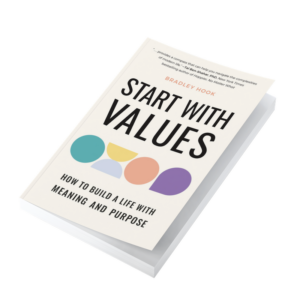We live in a time of answers. Type a question into a search engine or AI chatbot and you’ll receive an instant, high-quality, logical response.
But there’s one question no machine can truly answer for you:
What is the meaning of your life?
And the answer is surprisingly simple. I saw it years ago, printed on a weathered postcard in a café in Kathmandu:
The meaning of life is whatever you want it to be.
That’s not an escape clause. It’s a deep truth — and a powerful responsibility.
This is why I’ve dedicated myself to the science of meaning. To understanding where meaning comes from. Is it flow state? Is it achievement? Is it love? Struggle? Contribution? All of the above?
I’ve tried many things in my life, failed most, but tried again and again. Upon reflection, it was the journey, the valleys between peaks, the sleepless nights, and the quiet resolution to do better that counted. When I invested effort into things that matter to me: autonomy, creativity, kindness—the failures mattered less. They were part of the adventure rather than a catastrophe (although some did hurt).
It was acting in alignment with someone else’s values that made me feel real distress. And I’m not the only one.
What do people regret most at the end of life?
Sometimes, it’s easier to explore what diminishes meaning. In The Top Five Regrets of the Dying, palliative nurse Bronnie Ware shares what people wish they’d done differently when it mattered most:
- I wish I’d had the courage to live a life true to myself.
- I wish I hadn’t worked so hard.
- I wish I’d expressed my feelings more.
- I wish I had stayed connected with my friends.
- I wish I had let myself be happier.
These are not small things. They are signals. Warning signs. They point to the absence of something vital.
What is fulfillment, and how does it differ from regret?
Regret lives on one end of the emotional spectrum. Fulfillment lives on the other.
Fulfillment is meaning in motion. It’s resonance. Alignment. Integrity between values, actions, and aspirations.
Regret is the pain of misalignment — reheated and served up as experience.
What happens when challenge disappears?
Now, here we are, in a moment when technology promises to do our work, predict our needs, and optimize our lives. Elon Musk recently suggested that work may soon become optional — and that the real issue of the future will be human fulfillment.
Because what happens when we no longer need to strive? When challenge fades? When everything is handed to us?
Will we collapse into numbness, lose ourselves in AI-generated echo chambers, stars of our own simulations? Or will we manufacture meaning, seek resistance, compete, collaborate, stretch, and evolve?
How do we make the journey worthwhile?
The question is not what the future holds. The question is: how will we show up in it?
In all of these imagined futures — utopian, dystopian, or somewhere in between — one challenge remains: making the journey feel worthwhile. Doing something that matters, even if only to us.
Where did meaning come from — and where is it now?
For centuries, meaning was prescribed: by religion, kings, nations, or traditions. Now, we must choose. We must ask:
What is important to me?
What brings me to life?
What legacy do I want to leave?
It can feel like too much. But there’s a starting point that’s always within reach: your values.
Why are values the foundation of meaning?
Values don’t always shout. Sometimes they whisper. Sometimes they get buried beneath pressure, comparison, or noise. But they are there. And when uncovered, they become a foundation — for a meaningful life, and for the courage to live it.
Getting clear on your values allows you to design your own spiritual practice:
- Value fitness? Build it into your relationships and goals.
- Value kindness? Serve. Volunteer. Be gentle.
- Value peace? Meditate. Slow down. Speak truthfully.
It’s not about perfection. It’s about alignment. And alignment creates energy.
Friction creates sparks.
Why do we need resistance?
We need resistance. We need meaningful stress. We need moments that test us — and teach us.
Because growth is one of the most reliable paths to fulfillment. It’s why we feel proud not of what came easily, but of what we overcame.
Growth is uncomfortable. It can be downright painful. But it is, perhaps, the catalyst for meaning.
What are people truly proud of?
In workshops, I often ask people: What are you most proud of from the past year?
The answers are never effortless victories. They are stories of recovery, of resilience, of trying again. Of growth.
This is the hero’s journey. We venture out, we struggle, we grow. We return with insight to share.
Can AI help us, or replace us?
AI can support that journey. It can challenge us, coach us, even guide us. But it can’t walk the path for us. It can’t feel the joy of real connection, or the sting of real effort.
And it shouldn’t. Because those moments are ours.
Perhaps one day we’ll be offered synthetic fulfillment — fed through a headset or IV drip. But we’ll still crave something deeper.
We’ll crave meaning.
So, where do we begin?
And meaning begins with values.
If you don’t define them, the world will do it for you — through advertising, convenience, or popularity. And the result will be emptiness dressed up as success.
But if you do define them — and act on them — you’ll build something far more powerful: a life that feels like yours.
You’ll feel fulfillment.
You’ll find connection.
You’ll gain resilience.
You’ll rise to challenges and discover who you are becoming.
With values as your compass, and intelligence as your tool, reaching for the stars might not be a fantasy.


